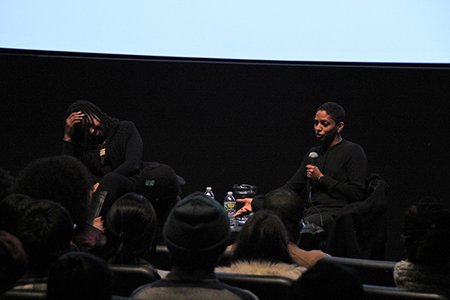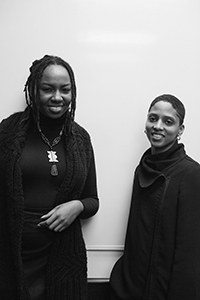#BlackLivesMatter founders talk about the movement

Opal Tometi, left, and Janaya Khan, leaders of the Black Lives Matter movement, speak to Emerson College students in the Bright Family Screening Room on Wednesday, February 10. Photo/Tori Bilcik ’17
Two leaders of the Black Lives Matter movement were on the Emerson College campus Wednesday, February 10, to talk to students about activism and racism as part of the College’s Black History Month celebration, “Solidarity.”
In a press conference prior to a talk they gave in the Bright Family Screening Room at the Paramount Center, Opal Tometi and Janaya Khan answered questions about student demonstrations, the role and limits of social media in organizing, and the interconnectedness of social justice struggles.

Opal Tometi, left, and Janaya Khan, leaders of the Black Lives Matter movement. Photo/Nydia Hartono ’17
Tometi, social activist and co-creator of the viral hashtag #BlackLivesMatter, said it’s “really encouraging” to see students rising up and protesting the treatment of people of color, as Emerson students did last April at a faculty assembly.
The hashtag started after the killing of Trayvon Martin, an unarmed black teen in Florida, in 2012, and gained momentum through the numerous deaths of young black people at the hands of law enforcement, but the Black Lives Matter movement goes far beyond police brutality, Tometi said
She said racism permeates every system and every institution, and “at the end of the day, we’ll miss it if we think it’s happening ‘over there.’ It’s quite literally everywhere.”
The two also spoke about the power of social media as a tool, but the need to back that up with action.
“In this period of our history, we have these social media tools, but it’s not the end all and be all,” Tometi said. “People in action offline is what’s going to make a difference.”
Khan, co-founder of Black Lives Matter Toronto, pointed out that the Black Panther Party was able to mobilize internationally without the benefit of Twitter or Facebook.
“The idea of a social media movement is too simple,” Khan said.
Social media is a tool for organizing, Khan said, but it’s also used for surveillance, and while for now activists are able to mobilize faster than a government can, it’s not always clear what the impact of social media will be in the future.
On the other hand, they said social media gives people who can’t or don’t want to access the “frontlines” of a movement a way to participate.
“Look at Formation,” Khan said, referring to Beyoncé’s new video, which invokes Katrina and a slew of black cultural references. “Every scholar came out of the woodwork for that. It basically broke the Internet.”
The movement cannot exist without allies, Khan said. For one thing, Toronto, where they live, only 8% of the population is black; in Canada as a whole, it’s less than 2%. For another, we’re all connected to the struggle.
“Once black people get free, everyone gets a little more free,” Khan said.
Tometi said she coined the phrase, “transactional solidarity,” which basically says, “I’ll show up for you if you show up for me.”
But it’s not a tit-for-tat proposition.
“We have to understand how our struggles are interconnected [to come to] a deeper understanding of why to show up,” Tometi said.
Categories